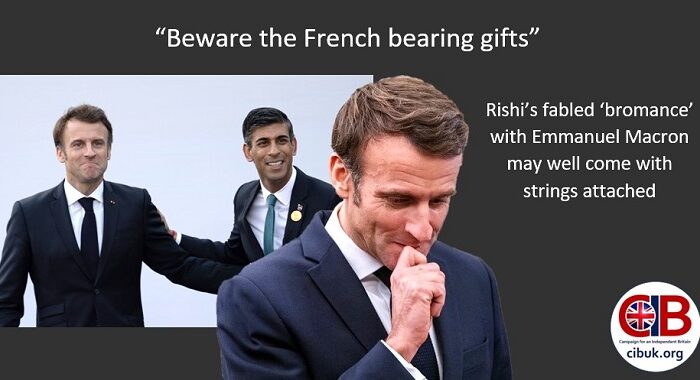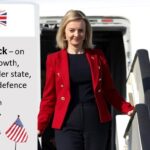Truss is back – on freedom, growth, low taxes, smaller state, higher incomes, wokery, China, Russia, defence… and Macron & Biden
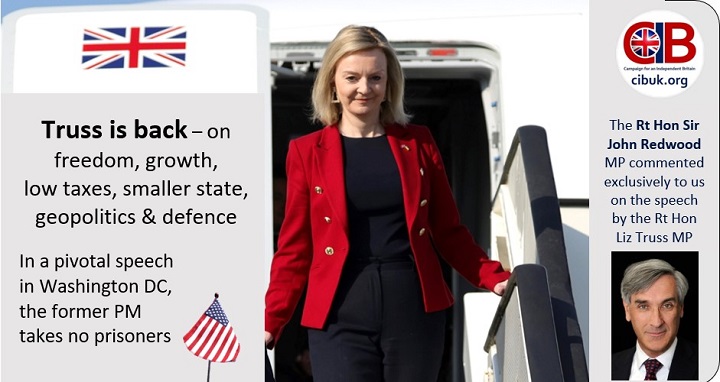
In a pivotal speech in Washington DC, the former PM takes no prisoners
CIBUK and Brexit Facts4EU summarise the lecture and the Rt Hon Sir John Redwood MP comments
On Wednesday (12 Apr 2023) in Washington DC, former Prime Minister the Rt Hon Liz Truss MP delivered the annual lecture at the Heritage Foundation’s Margaret Thatcher Center for Freedom. And she didn’t hold back.
Below we summarise the key excerpts from her speech and we also publish the full 57-minute video which includes a Q&A. This was a wide-ranging speech which will be welcomed by many ordinary people but which will be loudly condemned by globalists and those on the far left.
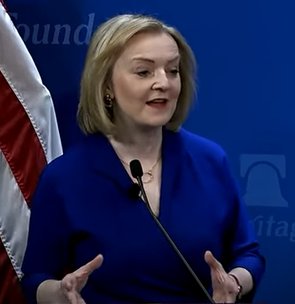
Basic questions
“We have to ask ourselves how do we feel now?”
“Do we feel that free enterprise has triumphed?
“Do we feel that we are able to say what we think in an open society?”
– The Rt Hon Liz Truss MP, Margaret Thatcher lecture, Heritage Foundation, Washington DC, 12 Apr 2023
In addition to the video and the transcript highlights, the Rt Hon John Redwood MP, who worked for Margaret Thatcher as her Single Market Minister and is a former Secretary of State, has added his thoughts exclusively for our readers.
Readers have the option of watching Ms Truss’s 38 minute speech in full below, and the follow-on questions and answers, or reading some key excerpts below that.
VIDEO : Liz Truss’s lecture to the Margaret Thatcher Center for Freedom in Washington DC
Wed 12 April 2023
Video courtesy of The Heritage Foundation
Former Minister under Margaret Thatcher and former Secretary of State the Rt Hon Sir John Redwood MP commented exclusively to us on the speech by the Rt Hon Liz Truss MP
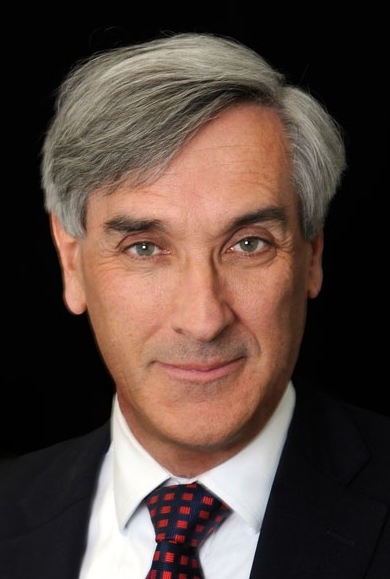
“Liz Truss rightly returns to her theme of the need for growth. She talks openly about the anti-growth coalition which overwhelmed her as Prime Minister. She links it in to the great struggle in the modern world as global politics splits into two blocs, a Chinese led one and a US led one.
“The former bloc uses state power against its own citizens, invades Ukraine and threatens Taiwan. It seeks to impose an alternative reality and different values on the world, as it opposes democracy, freedom and free enterprise. It tells its citizens what to think, what to say and what to do. It scythes down the entrepreneurs, stifles dissent and impedes individual success and prosperity.
“Liz is also right to point out how the western democracies have conceded so much ground to those who believe we need a bigger state and higher taxes on our side of the divide. On both sides of the Atlantic the Biden Administration, the EU and even the Conservative UK government have gone in for a massive expansion of subsidies, windfall and higher taxes, state direction of investment and innovation, and increasing limitations on people’s freedoms.
“The UK government is opposed from the socialist side, makes concessions and is told it is still not socialist enough. Socialists in the west want the state to provide, creating a pocket money society for citizens who will be expected to conform to state norms and seek state assistance and permissions for much of what they want to do. There is no point in standing up to Russia and China abroad if we import some of their bad techniques to our own government.
“As Liz says we need to warn of tax poverty, as many people struggle to pay the Income tax, National Insurance, energy taxes and the rest. We need to campaign against the cost of government crisis, as subsidies, more nationalised activities and an ever expanding government machine pre-empt resources and demand more taxes.
“I myself campaign for greater prosperity. I urge people to understand that it is free enterprise which offers choice, innovation and a better life for us. Government did not invent the mobile phone, does not drill for the oil and gas we need to keep warm and to travel, and does not till the fields to grow our potatoes. It is time to renew the case for lower taxes, a smaller state, and a flourishing free enterprise sector.”
– The Rt Hon Sir John Redwood MP, 14 Apr 2023, commenting to CIBUK and Facts4EU
For those who don’t have time to watch the full video
Below we provide some key excerpts from Ms Truss’s speech. Our summary is a little longer than usual because the former Prime Minister covered a lot of ground and had a lot to say. We have selected around half the content. The sub-headings and emboldened text below are ours.
Summary
Key excerpts from the speech by former Prime Minister the Rt Hon Liz Truss MP
Margaret Thatcher Center for Freedom, Heritage Foundation, Washington DC, 12 Apr 2023
“It’s over 30 years since the end of the Cold War and I think we all remember how it felt at the time: the excitement that we felt; the hope that we felt that freedom and democracy had won; that we were entering a new era of prosperity, a new era of hope, a new era of freedom for all of the world.
“But we have to ask ourselves how do we feel now. Do we feel freer? Do we feel that free enterprise has triumphed? Do we feel that we are able to say what we think in an open society? And I’m afraid the answer to all three of those questions is no.”
“And key ideas like the idea that the best people to make decisions about their own lives are people and their families. Or the idea that growth powered by free enterprise is the best way to create prosperity for our countries. Or the idea that it’s about your individual characteristics that’s important, your hard work and your talent, not what sex you are or what race you are, those things are not so important. How is it that those ideas have fallen by the wayside? How is it that these ideas have been lost, and that our sense of self belief seems to be dissipating?”
The freedom-haters have been gaining ground
“The fact is that people who hate freedom have been gaining ground. We know that there are proportionately fewer people living in democracies now than there were when Mrs Thatcher left office. And we can see across the world, our opponents and our adversaries acting with impunity. Whether it’s Vladimir Putin and his appalling invasion of Ukraine, an unprovoked invasion of a free democracy; or whether it’s President Xi and the build-up of armaments in China and the menacing of the free and democratic Taiwan. And all this time, what we’ve seen is accommodation and appeasement by the West of these authoritarian regimes.
“We allowed China to join the World Trade Organisation on very favourable terms and they are still designated a developing country. We saw Europe becomes dependent on Russian gas. At the same time as we were talking about climate change, we were importing more and more Russian gas and pouring more and more money into the coffers of Vladimir Putin. And what I think those regimes saw is, they saw our weakness.”
The core beliefs that made the world prosperous
“And this is despite the fact that it was those core beliefs, those core tenets, that made the world prosperous in the first place. The fundamental idea of freedom and self-determination, so different from the top-down tyranny of Russia and China. These ideas made us happier and they made us stronger. The idea of low taxes, limited government and free enterprise. …we’re seeing these economic ideas, this economic model, strangled into stagnation.”
“… we can see more clearly than ever that Russia and China, those two authoritarian regimes, are working together. China is buying influence around the world through its Belt and Road Initiative and other security agreements. We can see Russia with the Wagner group, working in parts of Africa, working in parts of Eastern Europe, seeking instability.”
“But can you imagine what would happen if Vladimir Putin was successful in Ukraine? If he was successful at extinguishing a free democracy? What lesson would President Xi take from that? He would take the lesson that he could act with impunity with respect to Taiwan. It would embolden him and it would embolden Russia to do more in Europe.”
The free world and autocracies
“What we can divide the world into is free democracies and autocracies. That is the battle we’re all fighting and we can’t just ignore that the battle; the battle isn’t going to go away. The battle is here and it is the battle of our generation.
“I’m proud about what the United Kingdom has done to stand up to authoritarian regimes. We were the first country in Europe to send weapons to Ukraine to help them defend themselves. We led on the sanctions that were put in place on Russia and made a real difference.”
“… I think the fact that those in Eastern Europe who really understand the Russian threat more than anybody else are advocating it is so vitally important because every day longer this war takes will be more people in Ukraine suffering, there’ll be a greater cost to rebuilding Ukraine for the free world after the war. But also the more that authoritarian regimes will become emboldened and the greater the cost for all of us later on of not acting now.
“Putin and Xi have made it very clear that they are allies against Western capitalism. That’s why I think it was a mistake for Western leaders to visit President Xi and ask for him to intervene in seeking a resolution to the conflict in Ukraine. I believe that was a sign of weakness. It’s also why it’s wrong for President Macron to suggest that Taiwan is simply something not of direct interest to Europe. I don’t agree with that at all. It is of direct interest to Europe.”
.
Working with the world
“We should be working with G7 allies, including the United States, including the European Union, including our friends in the Pacific, Japan, but also other other countries that aren’t part of the G7 such as South Korea and Australia. …. We need to learn the lessons that we didn’t learn from Russia.”
“I’m proud the United Kingdom has stepped up with the development of AUKUS….. And the UK has also joined the Trans Pacific Partnership, the CPTPP, the massive Pacific trade agreement. Again, I think that’s important. I think it’s important because I’m a free trader and I believe in free trade, but I also believe it’s important because it’s a bulwark to China. And I urge our British government and any future British government, that they must never allow China to join the CPTPP.”
“It was a US initiative in the first place. I believe it was a good idea. And if the US joins, first of all, it will be a benefit to US consumers. Secondly, it will help strengthen Indo-Pacific security. Finally, now that the UK is a member, it will be a fast-track route to a UK-US trade deal. What’s not to like?”
.
We have shown weakness
“I fear that we showed weakness. We didn’t invest enough in our defence, we didn’t make sure that we were economically robust and we made it easier for Putin to act with impunity.”
“We’ve seen low growth now for several decades. And this is particularly acute in the United Kingdom. … The symptoms that we’re seeing are low growth, we’re seeing high cost of living and we’re seeing real wages having declining value.”
“The sad truth is what I think we’ve seen over the past few years, is a new kind of economic model taking hold in our countries. One that’s focused on redistributionism, on stagnation and on the imbuing of woke culture into our businesses.”
“And then we have the ESG culture, perpetrated by many in big corporations, where the focus is on hitting a diversity target or hitting a social target rather than actually generating money for employees and for the country.
“Of course, this model results in more taxes, it results in more subsidies and it results in more regulation.”
Our energy policy makes no sense
“Another good example is the UK ban on fracking. This is despite the fact that energy costs in the UK are twice what they are in the United States. And what we are now doing is we are buying fracked gas from America. We are freezing it to minus 260 degrees Fahrenheit. We’re transporting it across the Atlantic Ocean, and then we’re re-gassifying it in Britain. Now why on earth does that make economic or environmental sense? It simply doesn’t.”
The ‘bailout culture’
“Across the board what we see is it’s getting harder and harder to get things done. And it’s getting harder to get on.”
“I fear that our countries are becoming social democracies by the backdoor.
“We’ve ended up in a culture where too many people and too many businesses expect a bailout. Now one of the core beliefs of Margaret Thatcher was the belief in personal responsibility. It was the idea that it’s down to you, how you get on in life. That through your own ideas, your own hard work, through your family, you can make your way in the world.”
“‘I’ve got a problem, I’ll call the government. My business is failing, I’ll get on the phone and sort it out. My investment isn’t doing very well, it’s the government’s problem. I can’t buy a house, I need to call the government.’”
“At the turn of the millennium, the state was spending 29% and 36% of national income in the United States and the United Kingdom. Today, those figures are 35% in the US and 47% in the UK. That is virtually half of every pound in Britain is now being spent by the state.
“It all makes the eras of Bill Clinton and Tony Blair look like some kind of libertarian paradise.”
Why I am in politics
“Now, the reason I’m in politics, and the reason I remain in politics, is I don’t believe that’s what ordinary voters want. I don’t believe that this is the society that people in Main Street in the US or the High Street in the UK actually want to see. I believe that people want to have control of their own lives, develop their own futures, have their own businesses. I don’t believe they want to be dependent on government handouts. People aspire to a higher standard of living, they want their children to have a better life than they had. And that is what we have to deliver but it’s becoming harder and harder to deliver in this low growth world that we’re now living in.
“When I was in No. 10 Downing Street, I tried to change this. I think if you are somebody who’s not worked in government, you perhaps don’t understand quite how hard it can be to get things done and to make that change. Boris Johnson said it was like one of those nightmares where you simply can’t move your feet. Tony Blair talked about the scars upon his back. I spent many years in government, I knew it’d be difficult. But I still didn’t understand quite how hard.”
Changing the status quo
“In my 10 years as a minister, I’ve seen all kinds of producer interests. Whether it was the legal establishment, the education establishment, the environmental establishment, the agricultural establishment. All of these groups often don’t want to see the status quo change.”
“And as Prime Minister, I simply underestimated the scale and depth of this resistance and the scale and depth to which it reached into the media and into the broader establishment. My plans for tax cuts and supply side reform were about making Britain more competitive. There were about making us a more successful country where we’re less reliant on government and I told you we were up to 47%. Those plans were backed by Conservative members across the country. But we faced coordinated resistance and we didn’t just face coordinated resistance from inside the Conservative Party or even inside the British corporate establishment. We faced it from the IMF and even from President Biden.”
“We need to be able to take on those who resist change and who don’t want change and we need to be able to ensure that we’re winning the argument enough to be able to do that and we need to start preparing now.”
Higher taxes means lower growth
“The national stagnation problem I’ve been talking about in both the US and the UK is now becoming an international problem; because not content with high taxes in their own countries, we see governments seeking to agree high taxes around the free world. I’m talking about the OECD minimum tax agreement, which will stop companies lowering things like corporation tax and becoming more competitive. In my view it’s nothing short of a global cartel and complacency.
“Because what will be the effect of these high taxes? Well, it will mean lower growth, it will mean higher spending and it will mean ultimately, that we are less competitive against our adversaries around the world and less economically strong.”
The challenge to our core values
“First of all, we need to start at the core problem which is the challenge to our core Anglo-American values. We’ve allowed our opponents to fill the airwaves, we’ve allowed them to crowd our campuses and we’ve allowed them to use our institutions to undermine our values. We share a great heritage of freedom between our two countries. The US Constitution, Magna Carta, there are many founding documents that I can mention.”
“Identity Politics, which is basically the idea that what group you’re in is more important than the person you are. Critical Race Theory, which says it’s more important how you appear on the surface than what your talents and attributes are. Or the whole debate about what is a woman that completely subverts basic principles of science and biology.… What we don’t see, we don’t see enough people prepared to take the orthodoxy on.
“I find it ironic that there’s so much criticism within our own societies and yet so many people also are trying to migrate to our countries. …And it’s an extraordinary contradiction.”
So what can we do about all this?
“We need to be as organised and we need to be as fearless as our opponents. And first of all, we need to be proud of our core values and we need to tell the story of freedom again. We need to make sure that people understand the benefits of living in a free society. They need to understand what individual liberty means. We need to challenge those who seek to cancel people and we need to be brave in speaking out and we need to challenge those who subvert the law of biology.
“There’s only one thing we can do, which is speak out every time this happens. We need to be intolerant of intolerance.
“And we need to tell the truth about what happened during the Cold War. I find it incredible that the younger generation now seem more favourably inclined towards communism and socialism.”
“The second thing we need to do is recapture the language.…. Maybe we should talk about rising taxes as ‘tax poverty’. And the fact that we have the highest taxes in 70 years as a ‘tax emergency’. And maybe rather than a ‘cost of living crisis’ what we’ve actually got is a ‘cost of government crisis’.
“We need to reduce the size of government and make our economies match fit.”
“Fourthly, believers in freedom need to link up across the Atlantic and beyond. We need a network of liberty, not a cartel of complacency. We need a UK-US trade deal, not a UK-US tax deal.”
“I want to see the UK adopt the technology restrictions on China that the US and Netherlands have as a starting point.”
“I was born in the 1970s, which was a dark decade for Britain, a dark decade of industrial crisis. But what we saw was the birth of new ideas. We saw an intellectual revival on the free right and then we saw the election of a Conservative Prime Minister, Mrs Thatcher, in 1979 who won hearts and minds and changed our country and together with President Reagan changed the future of the world.
My own setback – but the fight continues for us all
“Last autumn I had a major setback. But I care too much to give up on this agenda. I think it’s too important. And I know there are others who care too. I know there are people who care in the UK, I know there are people who care in the US and beyond.”
“We all need to think about what we can do. We need to get real about the threat from authoritarian regimes and their unwitting allies in the anti-growth movement in the West.
“We need to get organised about taking these forces on and we need to fight this battle of ideas once again.”
– The Rt Hon Liz Truss MP, Margaret Thatcher lecture, Heritage Foundation, Washington DC, 12 Apr 2023
Observations
This was a major speech by the former Prime Minister, covering a great many topics. In the 50th year of the Heritage Foundation of Washington DC, it was only fitting that a former British Prime Minister should have been chosen to deliver the Margaret Thatcher lecture.
The Facts4EU and CIBUK teams would like to thank Dr Nile Gardiner, host of the event and head of the Heritage Foundation’s Margaret Thatcher Center for Freedom, as well as the Rt Hon Sir John Redwood MP, Jonathan Isaby from Liz Truss’s office, and many others who made the above report possible.
Truss’s tanks
In her lecture, Liz Truss parked her tanks firmly on many international lawns. There were few major individuals or organisations who escaped her attention. These included President Xi of China, President Putin of Russia, President Biden of the USA, President Macron of France, the IMF, the OECD, the mainstream media – very few were left untouched.
On policy subjects the same is true. Ms Truss covered freedoms, economic growth, low taxes, smaller state, higher incomes, wokery, gender identity politics, China, Russia, defence – and even energy.
We hope readers will have found the speech interesting and welcome your views in the comment section below or by email. And please consider making a donation to our work now. Reports like the one above take a very large amount of time, and you don’t get things like this on the BBC….
The original article can be found here.
This report has been co-published with our affiliated organisation, Brexit Facts4EU.Org.
Please support our work today, to keep us going
Main image : Montage © CIBUK.Org 2023



